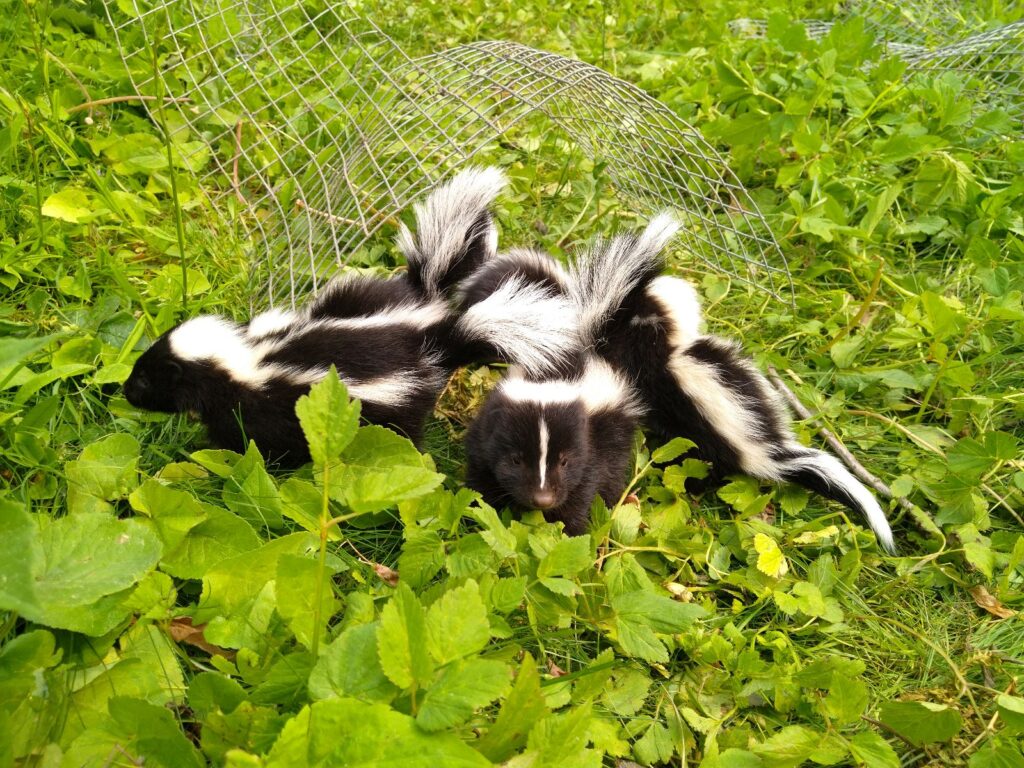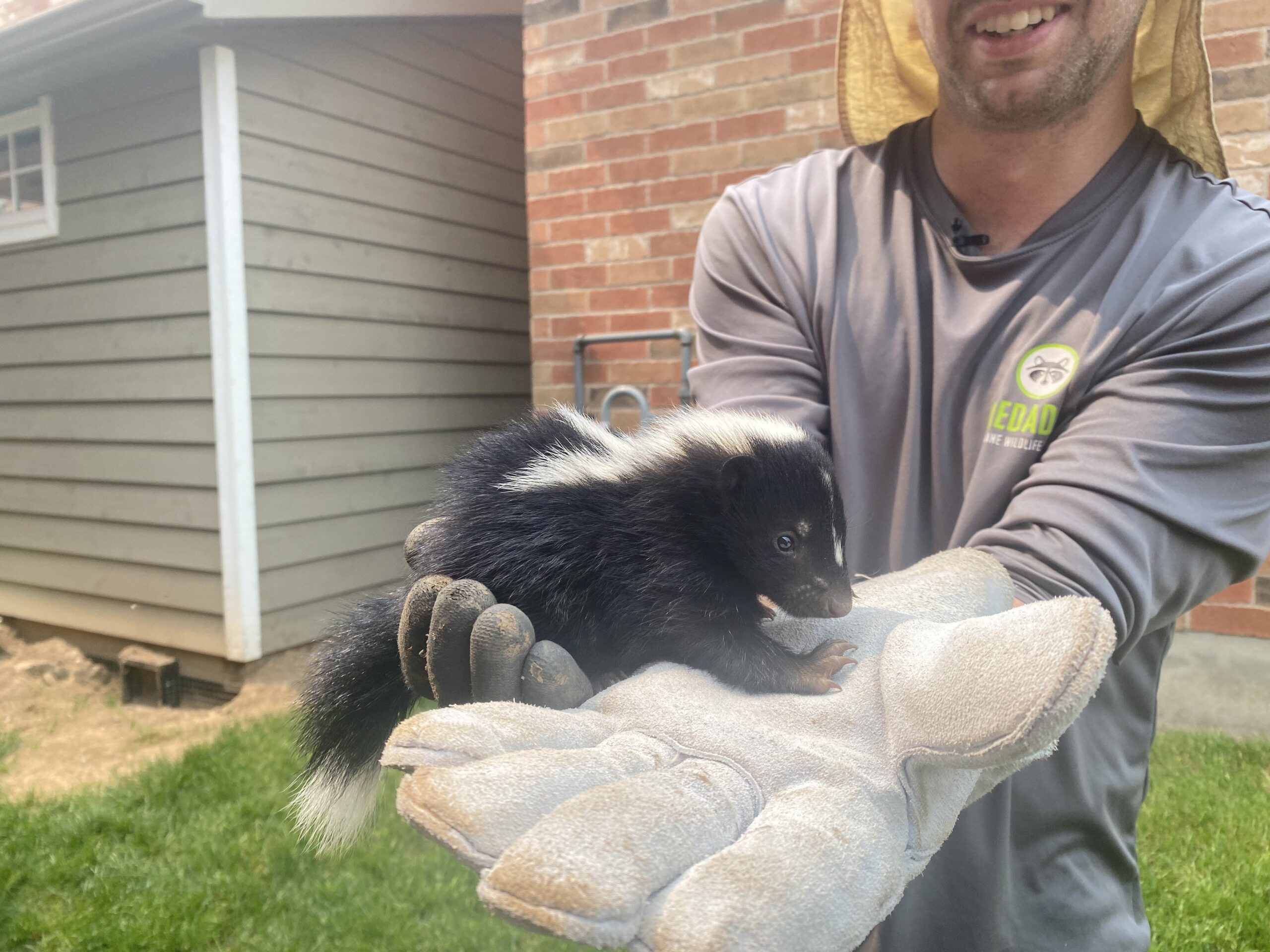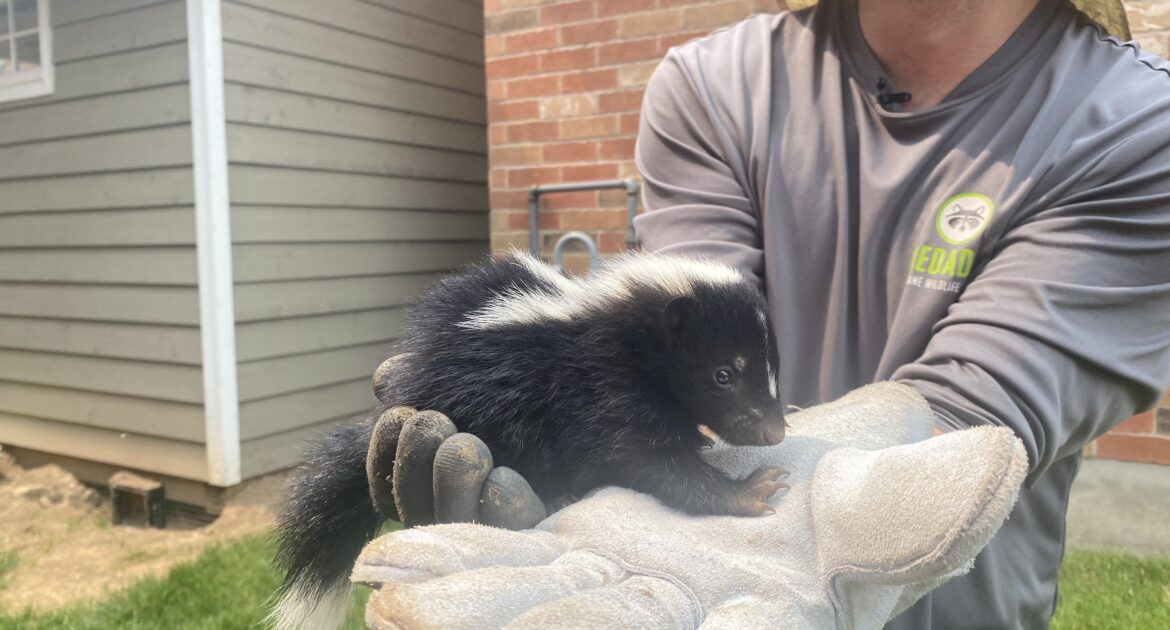Skunk spray has been a mainstay of comedic movies and television shows for a while, but it’s no laughing matter when it happens to you. The odour released by a skunk can cause a reaction that closes your nasal passages, similar to the effects of getting pepper sprayed. Getting rid of the awful smell may seem impossible, but with quick action, you’ll be stench-free once more.
What Is Skunk Spray?
Skunk spray’s uniquely terrible scent and staying power is due to its chemical formula. Skunks have glands that naturally create a sulphur-based compound called a thiol. In addition to smelling awful, it can cause temporary blindness if it gets in your eyes.
Why Do Skunks Spray?
Spraying is a deterrent for predators; if a skunk feels afraid, it will spray to drive the threat away. Usually, these critters give warnings before they let out the stink:
- Doing a handstand
- Stomping feet
- Flicking tail
How far can a skunk spray? The answer is a little terrifying: 15 feet. If you ever encounter a skunk, stay as far away as possible.
If a skunk has already sprayed, it should be fine to approach it, right? Unfortunately, these animals have several stink shots in their arsenal. How many times can a skunk spray? In most cases, a skunk can hit targets six consecutive times. After that, the glands slowly refill, taking as long as 10 days to reach full charge.
How Badly Does Skunk Spray Actually Smell?
After all the pop culture references, you probably wonder: What does skunk spray smell like, and is it actually that bad? Unfortunately, it really is.
According to those who’ve smelled it, skunk spray is close to rotten eggs or spoiled cabbage. It can remain for up to three weeks, making life miserable if you don’t know how to eliminate the odour.
How Do You Get Rid of Skunk Spray Odor?
Skunk spray removal is possible but by no means easy. The first step is to get the odour off your skin and out of your hair. Otherwise, you’ll be stuck with it while you try to clean other items. To get rid of skunk spray, try the following:
- Take a Bath or Shower Immediately: The spray quickly soaks into your skin, giving you a body odour no deodorant can tackle.
- Use Liberal Smounts of Soap: If you can, use Dawn dishwashing liquid or another grease-cutting soap.
- Use Chlorine Bleach To Neutralize Sulphur: In small quantities, chlorine is an effective pool and hot tub cleaner. If you have access to the powder or chlorine tablets used in pools or hot tubs, set up a chlorine bath by adjusting the amount for your tub’s dimensions. You only need to bathe for 15 minutes before taking a shower to rinse off any lingering residue. Note that the chlorine bleach used in the laundry is very concentrated, highly alkaline and not safe to bathe in or get on your skin. This chlorine bleach is caustic, toxic and will completely dissolve hair. Do not use it to clean your body under any circumstances.
- Try Baking Soda: Baking soda is also alkaline but not caustic or toxic; it also makes an excellent deodorizer. Run your bath and toss in 4 cups of baking soda. Make sure the baking soda has entirely dissolved before soaking for 15 minutes. You don’t have to rinse after a baking soda bath, as any residue will actually continue to combat odour. Of course, if you feel itchy or uncomfortable after your bath, you should rinse just to be safe.
While many people successfully remove skunk spray with just one bath, you may need two if you got a direct hit. If there’s a lingering odour, repeat the above steps on the second day.
Run Fans
Most skunk encounters take place in the wild, but there’s always the chance one will wander into your abode. If that happens, you’ll need to know how to get the skunk smell out of your house. One of the best approaches is running fans.
First, turn on electric ceiling and desk fans to keep the air circulating in your home. If you allow the air to remain stagnant, the skunk smell will sink deeper into your fabrics. Turning on all the fans in your home as soon as possible keeps the air in your house moving, preventing the odour from settling into anything too deeply. If possible, open your windows to bring in fresh air.
Change Out Your Filters
Did you know that the skunk smell can cling to air filters? If you don’t change them out, you may smell skunk for months as air passes through the vents. To avoid this, change out your air conditioner and heater filters before and after you treat the rest of your home for skunk odour.
Of course, not every spray encounter results in filter contamination. If you tackle the issue quickly, you can get away without changing them.
To see if your filters need changing, do sniff tests after you clean the rest of your home. If the filters don’t smell like skunk, you’re good to go.

Place Bowls of Vinegar Around the House
Sometimes the odour of skunk spray will linger without an identifiable source. If you can’t pinpoint what’s causing the smell, fill small bowls with a bit of white vinegar and place them around the house. Focus on the worst-smelling rooms since the stench’s source most likely originates there.
If you have pets or small children, you may want to consider putting the vinegar high up on shelves to prevent them from ingesting it. If a child or pet does ingest it, don’t panic — white vinegar is perfectly safe for dogs, cats and humans to consume. You’ll just have to place more out, and the person or animal who drank it probably won’t like the taste.
Fortunately, the vinegar should absorb much of the smell after 24 hours, so you won’t have to worry about watching pets and kids for too long. In most cases, the smell of vinegar should not be too potent, either.
Removing the Smell From Your Clothes
Skunk spray tends to soak into the clothing fibres, making the odour linger for a long time. Unless the clothing is a cherished piece, it’s best to toss it since the smell is practically impossible to eradicate. If the oily part of the skunk spray is not removed from the clothing, the stink will remain.
If you want to try to clean it, washing it with your regular detergent may not remove the smell completely. However, hot water, liberal amounts of detergent and 4 cups of vinegar in the wash water may work. You can also try alternating vinegar and baking soda in the wash to get the entire stink out.
One note: Be sure to smell your clothes before putting them in the dryer. If the odour remains, try rewashing them. If you put them in the dryer before the odour is entirely gone, you will seal them into the fabric. Then you’ll have no choice but to throw the clothing away.
How Can Skedaddle Humane Wildlife Control Help With Your Skunk Spray Problem?
Skunks are generally non-aggressive, but they will fight back when cornered. In addition to their stinky spray, they bite and scratch, which can pass on dangerous diseases. As a result, it’s better to contact professionals rather than try to figure out how to get rid of skunks on your own.
Fortunately, the Skedaddle Humane Wildlife Control team can wrangle critters safely, so you don’t have to worry about skunk spray or danger to your family or pets. If you think you have a skunk problem, call Skedaddle Humane Wildlife Control today or go online to schedule an inspection.






